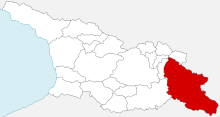
Shamil Salmanovich Basayev, also known by his kunya "Abu Idris", was a North Caucasian guerilla leader who served as a senior military commander in the breakaway Chechen Republic of Ichkeria. He held the rank of brigadier general in the Armed Forces of Ichkeria, and was posthumously declared generalissimo. As a military commander in the separatist armed forces of Chechnya, one of his most notable battles was the separatist recapture of Grozny in 1996, which he personally planned and commanded together with Aslan Maskhadov. He also masterminded several of the worst terrorist attacks that occurred in Russia.

Samir Saleh Abdullah al-Suwailim, commonly known as Ibn al-Khattab or as Emir Khattab, was a Saudi pan-Islamic jihadist. Though he fought in many conflicts, he is best known for his involvement in the First Chechen War and the Second Chechen War, which he participated in after moving to Chechnya at the invitation of the Akhmadov brothers.

Jama'at al-Tawhid wal-Jihad, abbreviated as JTJ or Jama'at, was a Salafi jihadist militant group. It was founded in Jordan in 1999, and was led by Jordanian national Abu Musab al-Zarqawi for the entirety of its existence. During the Iraqi insurgency (2003–11), the group became a decentralized network with foreign fighters with a considerable Iraqi membership.

The Georgian–Ossetian conflict is an ethno-political conflict over South Ossetia, which evolved in 1989 and developed into a war. Despite a declared ceasefire and numerous peace efforts, the conflict remained unresolved. In August 2008, military tensions and clashes between Georgia and South Ossetian separatists erupted into the Russo-Georgian War. Since then, South Ossetia has been under a de-facto Russian control.

Abu Ayyub al-Masri, also known as Abu Hamza al-Muhajir, born Abdel Moneim Ezz El-Din Ali Al-Badawi, was the leader of Al-Qaeda in Iraq during the Iraqi insurgency, following the death of Abu Musab al-Zarqawi in June 2006. He was war minister of the Islamic State of Iraq from 2006 to 2010 and prime minister of the Islamic State of Iraq from 2009 to 2010. He was killed during a raid on his safehouse on 18 April 2010.
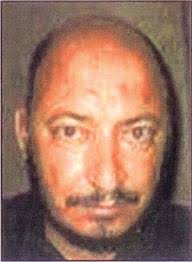
Abu Omar al-Baghdadi, born Hamid Dawud Mohamed Khalil al-Zawi was the Emir of the Islamic militant umbrella organization Mujahideen Shura Council (MSC), and its successor, the Islamic State of Iraq (ISI), which fought against the U.S.-led Coalition forces during the Iraqi insurgency.
Abu Qaswarah al-Maghribi was a Moroccan national who was reportedly the No. 2 leader of Al-Qaeda in Iraq and the senior leader in Northern Iraq. He died in a building in Mosul during a shootout with American troops.
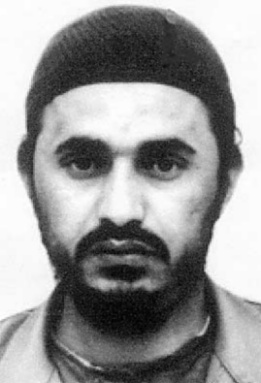
Abu Musab al-Zarqawi, born Ahmad Fadeel al-Nazal al-Khalayleh, was a Jordanian jihadist who ran a terrorist training camp in Afghanistan. He became known after going to Iraq and being responsible for a series of bombings, beheadings, and attacks during the Iraq War, reportedly "turning an insurgency against US troops" in Iraq "into a Shia–Sunni civil war". He was sometimes known by his supporters as the "Sheikh of the slaughterers".
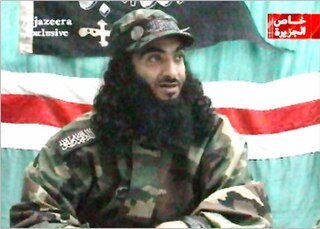
Abu al-Walid was a Saudi Arabian of the Ghamd tribe who fought as a "mujahid" volunteer in Central Asia, the Balkans, and the North Caucasus. He was killed in April 2004 in Chechnya by the Russian federal forces.

Abu Hafs al-Urduni, also transliterated as Abu Hafs al-Urdani, was a Mujahid Emir (commander) fighting in Chechnya. He was killed in Dagestan on November 26, 2006.

Melfi Al Hussaini Al Harbi, more commonly known as Muhannad, and also known as Abu Anas, was a Mujahid Emir (commander) fighting in Chechnya. Following the death of Abu Hafs al-Urduni on 26 November 2006, he was named leader of the battalion of foreign fighters once commanded by the notorious Saudi-born Ibn al-Khattab.

The Salafist Group for Preaching and Combat, known by the French acronym GSPC, was an Algerian islamist terrorist faction in the Algerian Civil War founded in 1998 by Hassan Hattab, a former regional commander of the Armed Islamic Group (GIA). After Hattab was ousted from the organization in 2003, the group officially pledged support for al-Qaeda, and in January 2007, the group officially changed its name to the "Al-Qaeda Organization in the Islamic Maghreb" (AQIM).

Tanzim Qaidat al-Jihad fi Bilad al-Rafidayn, more commonly known as Al-Qaeda in Iraq, was a Salafi jihadist organization affiliated with Al-Qaeda. It was founded on 17 October 2004, and was led by Abu Musab al-Zarqawi and Abu Ayyub al-Masri until its disbandment on 15 October 2006.
Abu Ghadiya was an al-Qaeda in Iraq (AQI) militant and smuggler. The United States Treasury Department claimed his real name was Badran Turki Hishan al-Mazidi and that he was born sometime between 1977–1979 in Mosul. However, other reports claimed that Abu Ghadiya was born in Damascus in 1976 and his real name was Sulayman Khalid Darwish. He graduated from the Damascus University Dentistry School sometime during the 1990s, until he later went to Afghanistan and joined al-Qaeda. He was primarily involved in the logistics of AQI's effort in Iraq and assisted in smuggling weapons, money and fighters across the Iraq–Syria border. The US claimed he was targeted and killed, in a cross-border raid conducted by the U.S. military and possibly the Syrian government as well on October 26, 2008. However, an al-Qaeda in Iraq obituary released in August 2006 says that Abu Ghadiya was killed by the Saudi-Iraqi border sometime in November 2004. The Syrian government protested the raid claiming, that it killed eight civilians. Journalists who reached the attack site reported claims by local people who said that the victims of the raid were all innocent civilians.

Saleh Al-Qaraawi is a Saudi militant Jihadist.
Abdulla Kurd, , was a Kurdish militant who was a commander of the Mujahideen in Chechnya. Kurd was the top deputy to Saudi-born field commander Muhannad. Following Muhannad's capture and assassination near the village of Serzhen-Yurt on 21 April 2011, according to the Russian National Anti-Terrorist Committee, Kurd assumed Muhannad's position. Kurd was killed by Russian security forces in the Cheberloevsky area of Chechnya on 3 May 2011.

The Lopota incident, known in Georgia as the special operation against an illegal armed group in Lopota, was an armed incident where the Georgian special forces engaged an unknown paramilitary group of about 17 unknown individuals which had allegedly taken several people hostage in the remote Caucasus gorge of Lopota near the border between Georgia and the Russia's Republic of Dagestan.
Khalid Mustafa Khalifa al-Aruri, known as Abu al-Qassam, was a Palestinian-Jordanian Islamic militant and a member of al-Qaeda who was the leader of the Guardians of Religion Organization.
Jaish al-Ta'ifa al-Mansurah was an Iraqi Salafi-jihadist insurgent group that fought against US troops and their local allies during the Iraq War. In 2006 the group aligned itself with al-Qaeda and helped establish the Mujahideen Shura Council.
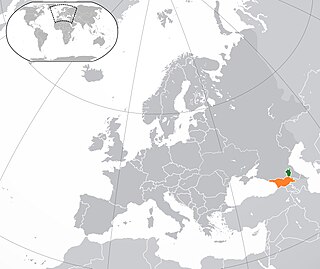
Relations between Georgia and the Chechen Republic of Ichkeria began in 1991, when both countries declared independence from the Soviet Union. They continued to pursue relations until Chechnya was re-annexed by Russia in 2000.
